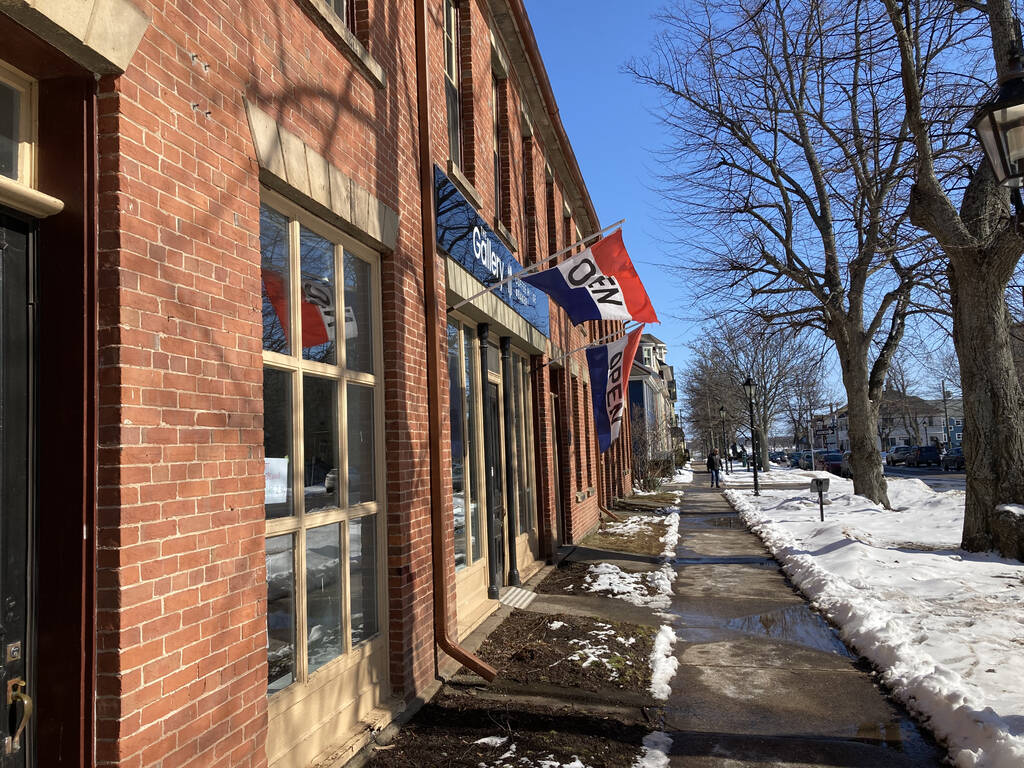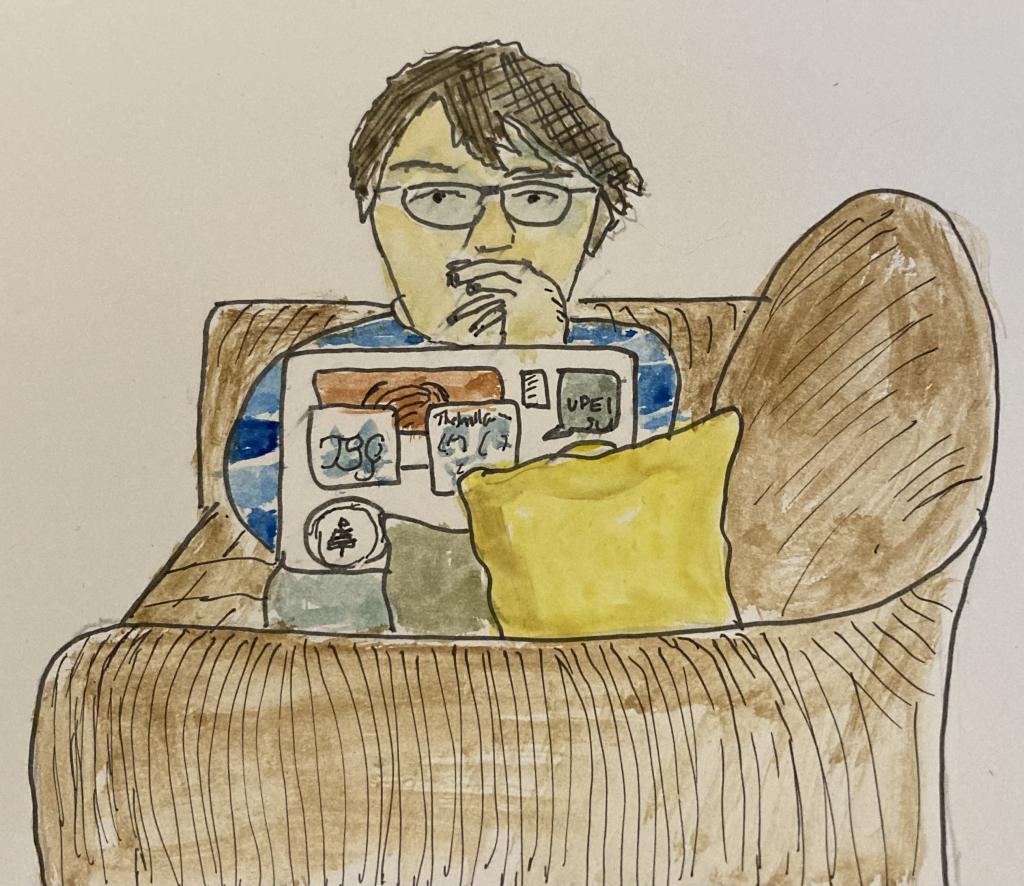The release of a cover of You Only Get What You Give by Pomplamoose last week led me back to the 1998 original by New Radicals.
For a song that has, over the last two decades, seared itself into the uplifting pop cabinet of our consciousness, it’s worthy remembering that New Radicals released only a single album, the one the track appeared on, Maybe You’ve Been Brainwashed Too. If that’s gonna be the album on your tombstone, it’s a pretty good one.
The band reunited to perform at the Biden-Harris inauguration; there was a little less limitless youthful exuberance in the lead vocals, but they clearly still got it.
My friends Martin and Maida called me in a delighted tizzy this afternoon, having just come from the soft opening of The Gallery Coffee House and Bakery on Great George Street in the Heartz-O’Halloran.
They knew that telling me this would engender a resonant tizzy in me, what with this being 222 m from my house and 165 m from my office.
The new enterprise comes from the same crew behind the Black & White in St. Peters, and Fritz Chocolates.
Of course Oliver and I dropped everything and headed right over: it’s a beautiful, light-filled space, and, as they do in St. Peters, they make an excellent espresso. As having a third place becomes culturally acceptable again in the coming months, I imagine my life will expand to include this one quite comfortably.
Welcome to the neighbourhood new friends.

The New Brunswick College of Craft and Design offers an Alone Together Residency. From the FAQ:
WHEN WILL I KNOW IF I’VE BEEN ACCEPTED?
You’ve been accepted! This is not an application form. This is a commitment to yourself. Make the time you need and do something you want to. This residency is meant to provide a structure and stability from which you can work creatively
WHERE DO I DO THIS?
Wherever you already are. We are all living in some kind of isolation right now - for some of us that means we’re just one at home, others are with roommates, partners, and family. Whatever the makeup of your isolation, we want you to find a way to make space for your creative endeavours.
WHEN DOES IT HAVE TO BE DONE BY?
You decide! Set your own timeline and when you feel finished, email us and we’ll send you a congratulations!
I love this. In part because I’ve unknowingly been immersed in this sort of residency for a decade.
Michael J. Fox in Good Housekeeping in 2011:
You know, there’s a rule in acting called “Don’t play the result.” If you have a character who’s going to end up in a certain place, don’t play that until you get there. Play each scene and each beat as it comes. And that’s what you do in your life: You don’t play the result.
So you get diagnosed with Parkinson’s, and you can play the result. You can go right to, “Oh, I’m sick.” It took me seven years to figure out that I’m not at the result. I’m not at the result till the end. So let’s not play it. It’s not written yet. And so that’s the attitude I take in life. Another expression is “Act as if.” Act as if it’s the way you want it to be, and it’ll eventually morph into that.
No life advice I’ve read this year has been more practically helpful than this.
The Suburbs are Stunned by Bowie Rowan, in Belt Magazine, is a such a beautiful, well-crafted piece of writing.
As near as I can tell, Charlottetown is twinned with three other places: Shediac, NB, Forest City, NC and Ashibetsu, Japan.
With the revivified Atlantic Bubble set to be announced today, I thought I might sneak in and suggest an alternative: let’s everyone bubble with their twins.
I mean, Shediac, what were they thinking?!
But I for one would welcome the chance to jet across the Pacific to see the Hokkaido Kannon and the ruins of the fake Green Gables.
And Forest City: it’s a city in a forest. Imagine spending late April hanging out with the Na’vi, catapulting out for coffee every morning on the zip line, enjoying the warm, mud-free spring.
Sounds better than the Irving in Truro, am I right?
I may be too late to sway Atlantic Premiers on this issue, but perhaps, regardless, it’s time to reconsider our twins? Paris anyone?
One of the unanticipated side-affects of le grande réarrangement is that I no longer have a television in the living room. For the first time since before Oliver was born.
Over the last 48 hours this has made me realize how frequently I’d pop the TV on simply to avoid doing something else. Now that it’s gone, I’ve no choice but to make sketches of Oliver, read Mary Ruefle, and contemplate the silence.

Matt Webb writes beautifully about ASMR:
ASMR is a legit cultural phenomenon, and it is no weirder to be microdosing intimacy on YouTube than it is to get thrills out of sitting around with your friends and watching 90 minutes of people in costumes hitting each other while rousing music plays.
And:
What if there were neurodivergent-optimised versions of all media?
Not just ASMR Bee Movie but taciturn and slow-paced superhero movies, for people who are easily overwhelmed, like French New Wave meets the Marvel Cinematic Universe, or for completionists, speedrun Netflix Originals where each episode is only 3 minutes and expunges narrative irrelevant to the overall season arc, with everything fitting together neatly at the end.
On Sunday afternoon I broke down in great buckets of tears, more tears than since that cold, snowy Sunday last January I spent by myself in St. Paul’s, pouring myself out while listening to Ingrid Michaelson on repeat, on the day before we celebrated Catherine.
Last week, in the wrenching, helpful book Before and After Loss, I read this:
As we grapple with loss, let’s be thoughtful about healing, restoration, and growth. Let’s not be satisfied with healing and restoration alone, let’s strive for growth. Healing results in the survival of a coherent self after traumatic loss. Growth recasts today’s insurmountable problems as tomorrow’s opportunities.
Sunday’s volcano of tears came not from sadness, but, ultimately, from understanding the truth of that statement.
I have been healing and restoring, slowly but surely, reestablishing a firm foundation, both internally and as regards the laundry and the celebration of major holidays.
What I haven’t been doing is growing. Instead I’ve kept myself lashed to a particular version of me, a self that, in so many ways, no longer exists.
This is a stage of grief I didn’t anticipate: it’s not at all about loss or absence or death, it’s about what happens next. It’s not about anyone else but me. And that’s weird.
It never occurred to me that would be overwhelming, as overwhelming, in fact, than much of what’s come before. Fortunately, coming out the other side of the cavalcade of tears I found myself hopeful. That was nice.
And this morning I gave physical form to that need for rearrangement by recasting our living room. Like me, most of the parts are original equipment; but how they fit together is very much “you mean I could put that over there!?” Onward.


 I am
I am